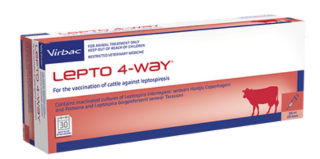
Leptospirosis in Cattle | New 'Pacifica' Strain
Leptospirosis (lepto) is a disease caused by bacteria that can be spread from animal to human, otherwise known as a zoonotic disease. The impact lepto can have on farm is devastating, with severe flu symptoms in humans and in some cases debilitating illness requiring hospitalisation. A recent survey conducted by Massey University showed that half of those affected were still experiencing symptoms a staggering 8 months after diagnosis.
Leptospirosis is contracted most commonly through exposure to the urine of infected animals, either through direct contact or via contaminated water. The bacteria enter through cuts or grazes on our skin, or through the mucous membranes of our eyes, nose and mouth. There are different types of lepto, with cows often showing no clinical signs. This means that working with dairy cows can pose a significant risk for contracting lepto, so preventing exposure is vital.
Two different leptospiral species (L. borgpetersenii and L. interrogans) have been isolated from NZ animals. Leptospira are also commonly classified by their serological characteristics (serovars). In this country these are L. borgpetersenii serovars Hardjobovis, Ballum, Balcanica and Tarassovi and L. interrogans serovars Pomona and Copenhageni. In NZ serovars Hardjobovis, Pomona, Ballum and Tarassovi are currently those most commonly identified with disease in humans whilst Hardjo bovis and Pomona are the types most significant in livestock.
Since the 1970s we have been fortunate to have highly effective cattle vaccines, which have reduced the rate of human infections dramatically. Unfortunately, in recent years we have seen cases of lepto in farmers and staff (including teat sealing technicians) working on vaccinated farms, many of which are thought to be due to a newly discovered strain of lepto within our dairy herds. This new Tarassovi-like strain, known as 'Pacifica', wasn’t covered by the traditional dairy cattle lepto vaccines. Recent research suggests Pacifica could be present in almost three quarters of dairy herds nationwide.
An estimated 90% of New Zealand dairy farmers already vaccinate their herds to protect themselves and their workers. However, vaccinated herds can still shed bacteria if their vaccination schedule is not consistent.
The new Lepto 4-Way® vaccine provides a crucial immune response against the emerging Pacifica strain as well as the three strains (Hardjo, Pomona & Copenhageni) previously covered by traditional vaccines. Upgrading to Lepto 4-Way® is an essential step to ensure the health and safety of your team. Your veterinarian can help you adjust your vaccination schedule for the upcoming season.
While vaccination is an integral part of your lepto management plan, strict on-farm health and safety protocols remain paramount to protect you and your team.
-
Personal Safety: Always stand clear of urinating cows and effluent spraying. Cover any cuts or grazes and avoid eating, drinking, or smoking in the milking pit.
-
Pest Control: Rats and mice can carry other strains of lepto, so effective pest control is vital to reduce risk.
-
Water Safety: Lepto bacteria survive well in water. Be cautious around surface water and flood events, as well as effluent ponds and spreaders.
-
Early Intervention: If you suspect you or a staff member have been infected, see a doctor as soon as possible, as lepto can be treated with antibiotics.
A case of lepto can have a significant impact on your team and business. Prevention is critical. By educating your staff and upgrading to the Lepto 4-Way® vaccine, you can ensure you have taken every possible step to protect the health and safety of your family and everyone who works on your farm.
A case of lepto could have a huge impact on your team at a time you can least afford it. Prevention is critical, so staff education and upgrading your vaccine to Lepto 4-Way® means you have done all you can to ensure the health and safety of you, your family and anyone who works on your farm.
For more information on leptospirosis, talk to your vet or visit lepto.co.nz
Lepto 4-Way® is a Restricted Veterinary Medicine. Available only under Veterinary Authorisation. Registered pursuant to the ACVM Act 1997, No. A012030.

